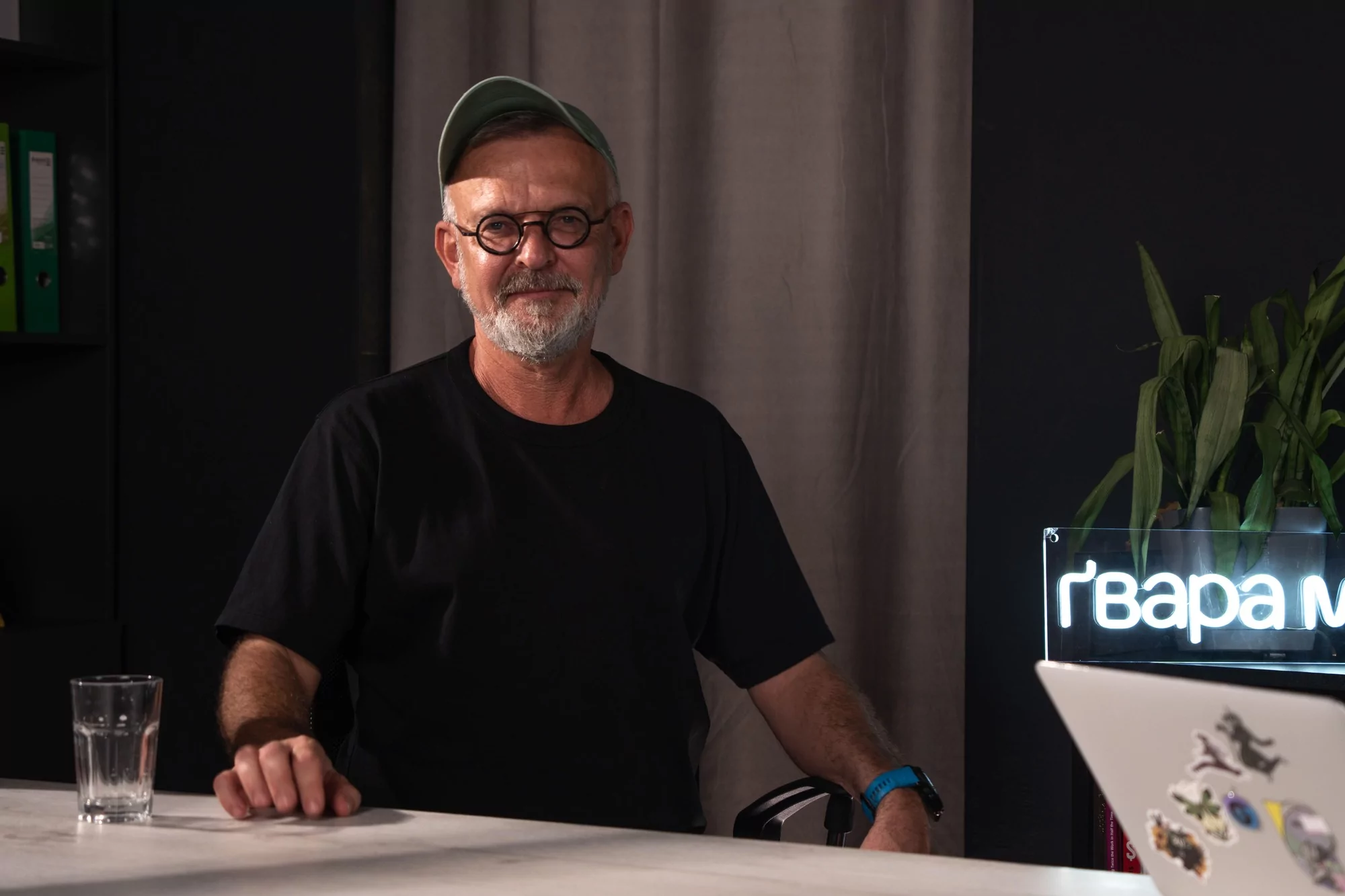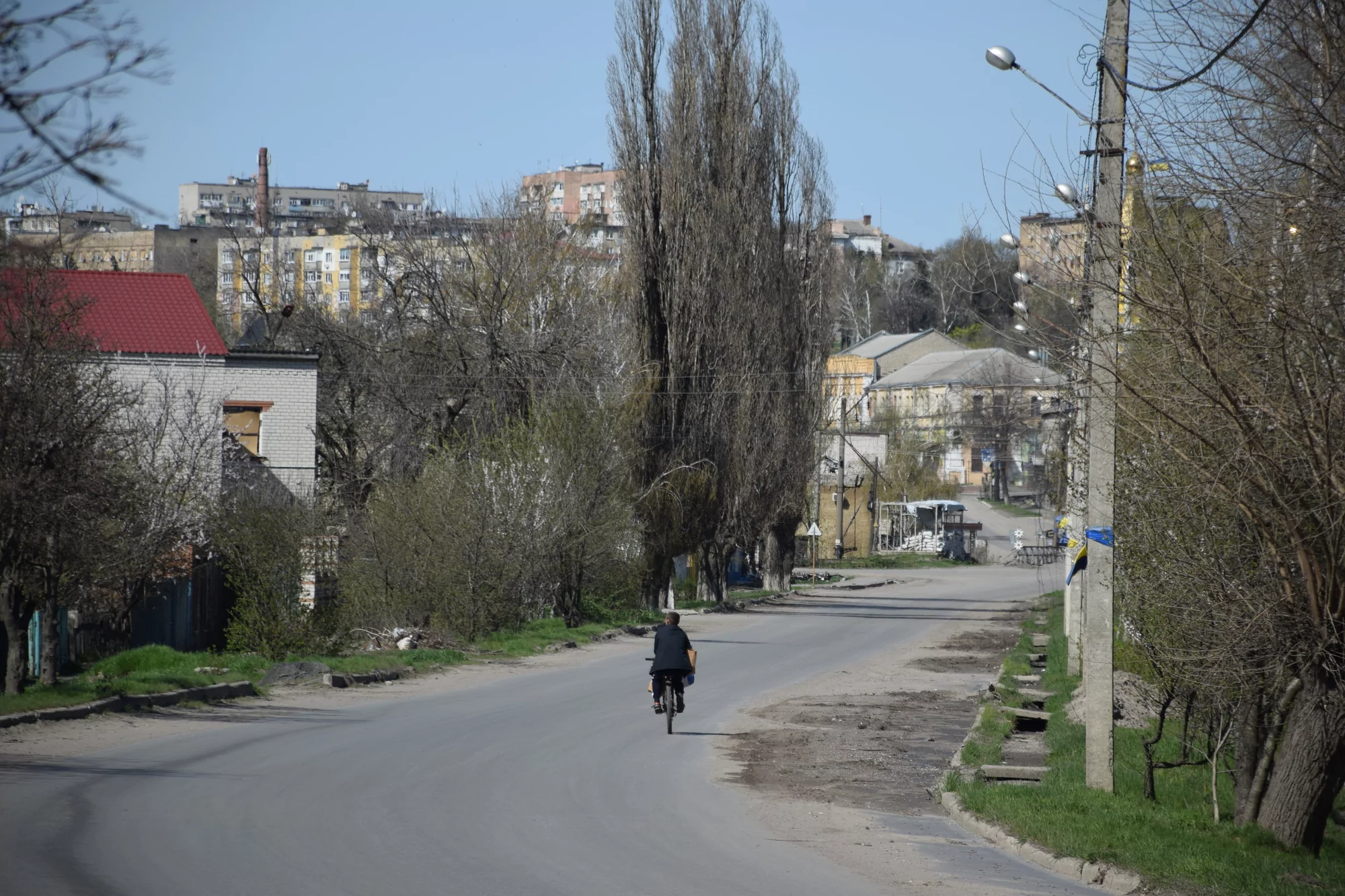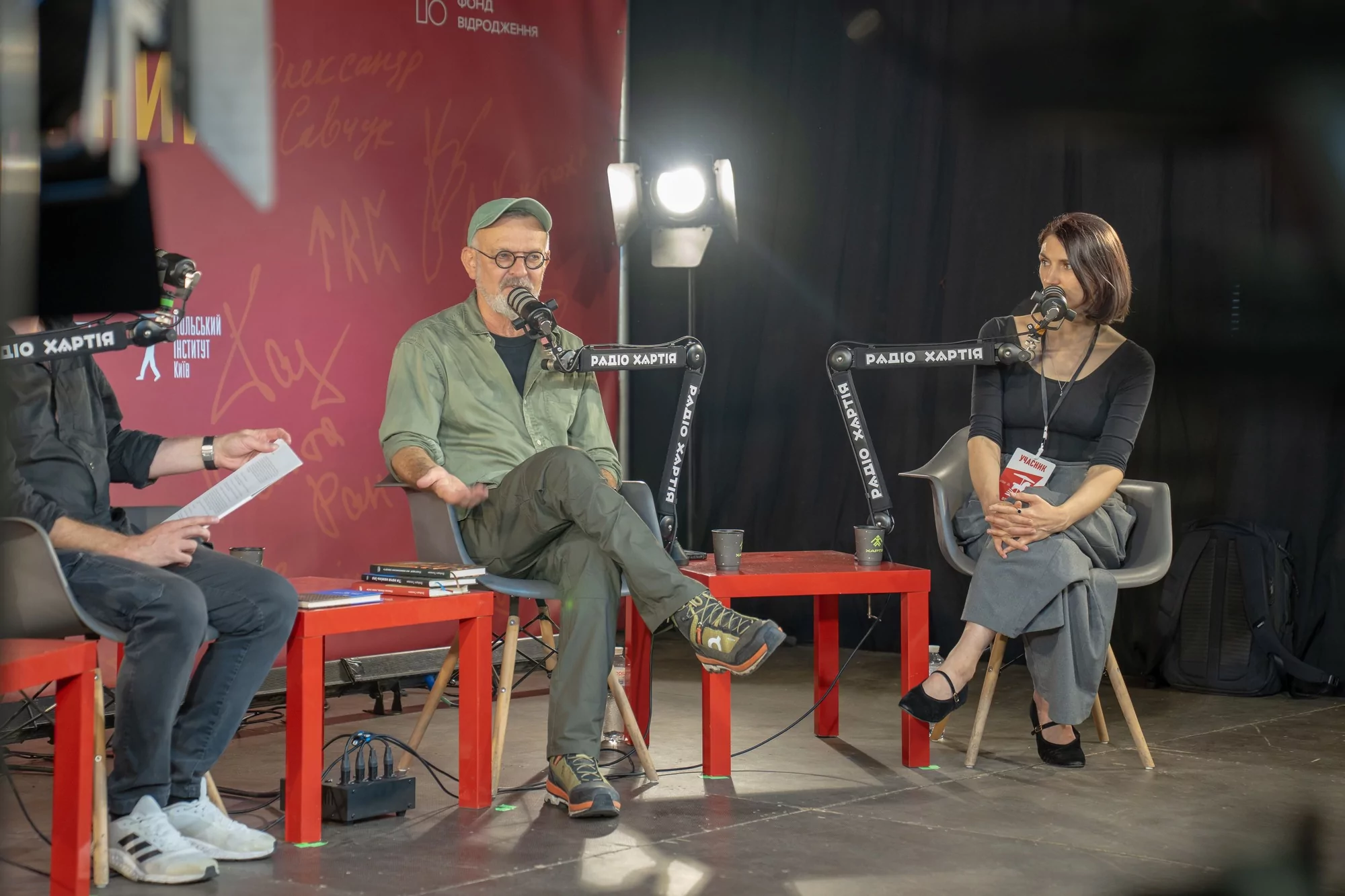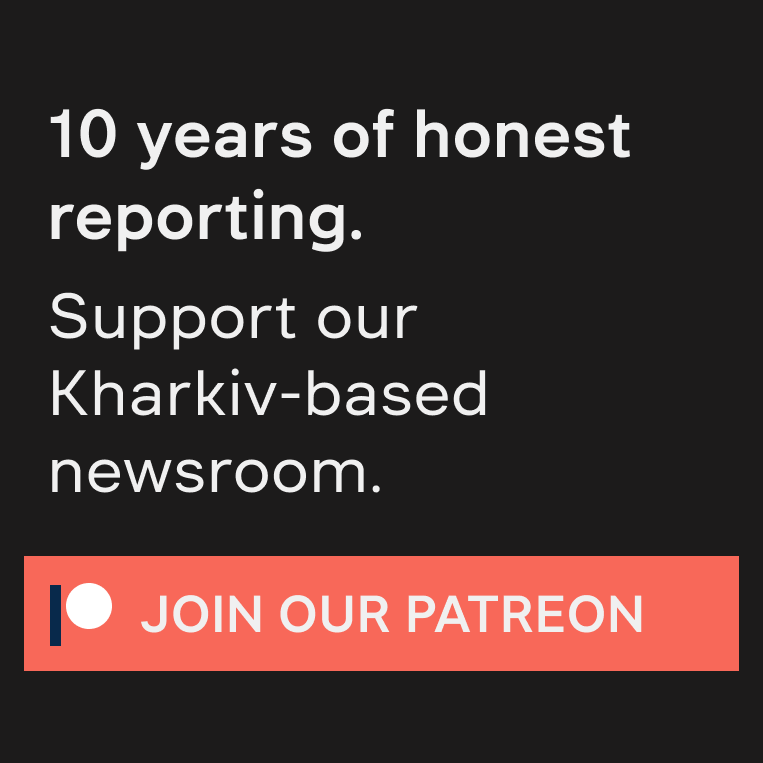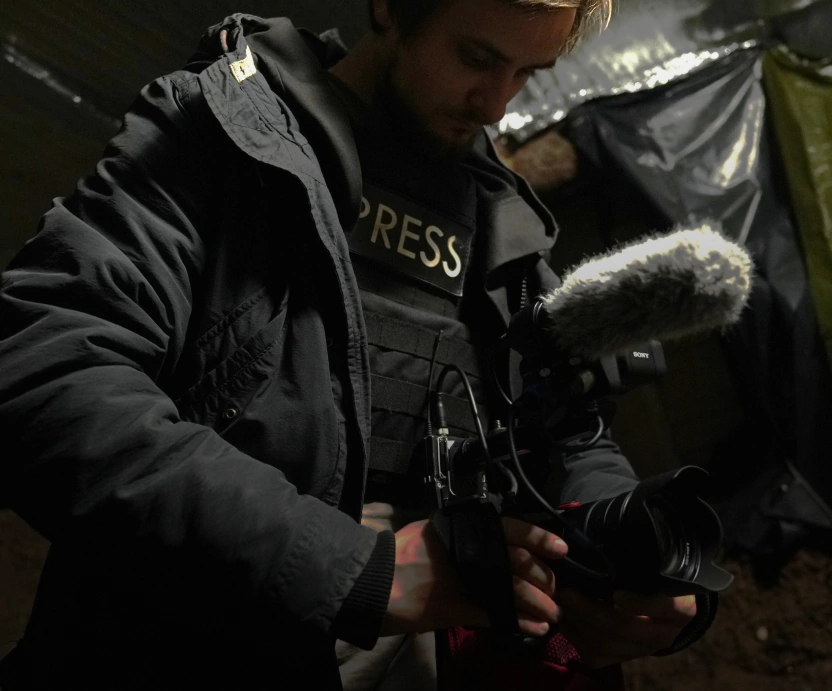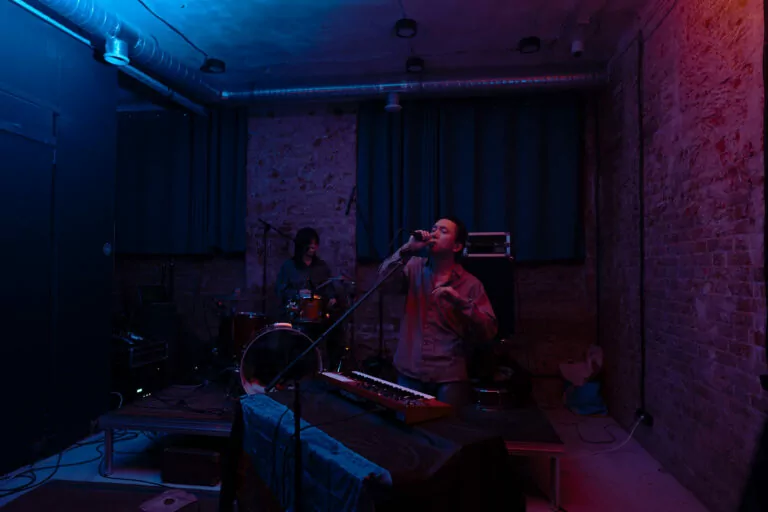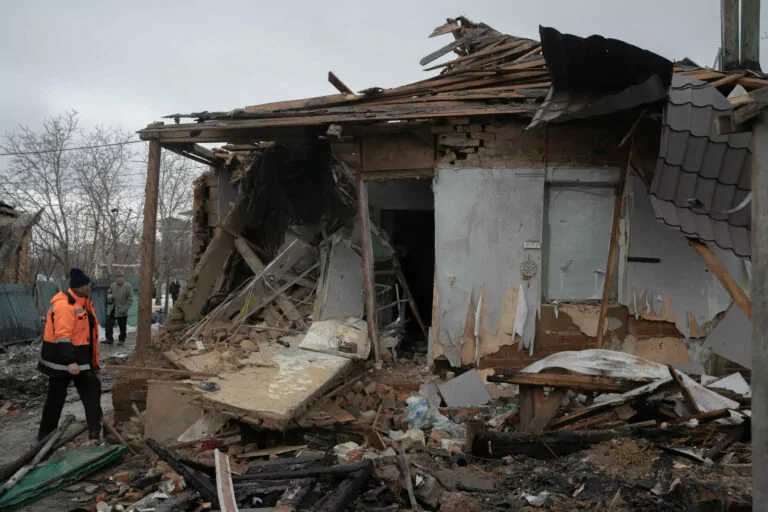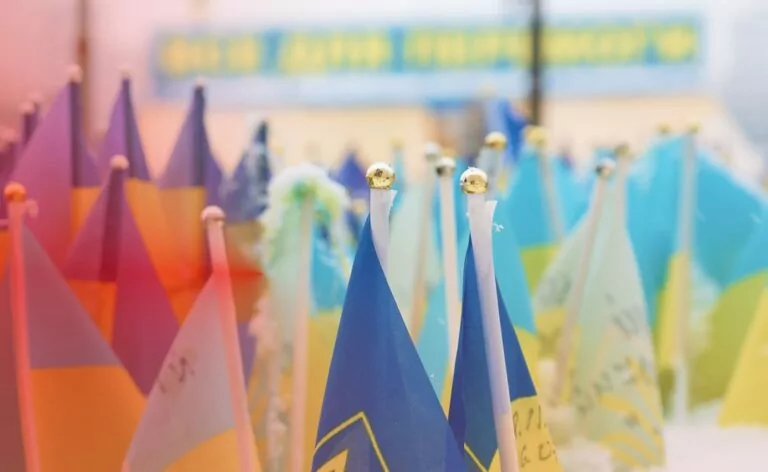Wojciech Tochman is a Polish reporter, writer, and volunteer whose books, translated into many languages, examine post-genocide societies in the former Yugoslavia, Rwanda, and Cambodia etc.
Gwara met with Wojciech Tochman in late August during his visit to Kharkiv, discussing his volunteer work in Ukraine, a nature of the genocide, an “evil gene” in Russians, and Polish-Ukrainian relations. Olena Sheremet translated the conversation between Polish and Ukrainian.
This interview has been edited and shortened for better readability.
“A reporter must record the world”
You once said that a reporter is someone who must always seek answers. What questions are you seeking answers to now in Ukraine, in the fourth year of this full-scale war with Russia?
My Polish readers asked if I’d write something about the war in Ukraine. I always said Ukraine has its own wonderful writers who know this war from the inside.
Polish authors had already published several books about it, so I thought my work was unnecessary.
Instead, my foundation and I raised money to help animals affected by the war (in Ukraine—ed.). But when I came here with aid, people shared their human and animal war stories with me.
As a reporter, I realized I couldn’t keep these stories to myself—I had to write them down.
I’ve always been interested in human relationships—in good times and bad. Now I’m seeking answers about what happens between people and animals during war.
I’m exploring the rescue of animals that are left behind in war zones after people flee or perish. Why is rescuing these animals, which aren’t yours, as important as rescuing people?
You volunteer with Animal Rescue Kharkiv [volunteer organization that evacuates animals from the frontline areas in Ukraine]. What impresses you most about this work, and what’s been your most memorable experience?
That’s difficult to answer. I’m impressed by the courage of rescuers from Animal Rescue Kharkiv, and another organization working in both Kharkiv and Donetsk regions.
People think volunteers are a little crazy. They say that about themselves—maybe about all Ukrainians: we’re all a little crazy here. I like this craziness.
I decided to write about it because a reporter must record the world.
Recently, I was on a 22-hour evacuation mission in Dobropillia (a city in western Donetsk Oblast, near Pokrovsk. Ukrainian forces recently repelled a Russian offensive there). We brought back cats and dogs, some of them sick. We had to hide under trees from drones.
This work requires courage, but also enduring incredible stench in the car. These animals spend hours in carriers, nervous. The smell is overwhelming, but what’s that compared to their suffering? Behind every cat or dog is a human story.
I’m interested in how people experience this war, which is different from all others. I have animals and can’t imagine leaving them. But I should understand this—I’ve lived through it.
At 11, I lived with my parents in Iraq and found a cat—my first pet. Three months later, the Iran-Iraq War began in 1980. We evacuated on Polish government orders. My parents left the cat with our Arab neighbors, unsure if he’d survive the journey.
That was 45 years ago. Only last December in Kupiansk (a city in eastern Kharkiv Oblast, liberated by Ukraine in 2022. Russians re-entered the city in 2025 and are attempting to recapture it) did I realize that this childhood story of abandoning my pet had stayed with me—a complex, difficult emotion.
I don’t know what happened to that cat. My Arab peers likely went to war during those eight years. They probably died.
So what am I looking for in Ukraine? Actually, I don’t know. I sit at my computer and search for the answer myself.
“Killing several million people is a technically difficult job”
You’ve worked in countries that survived through genocide and said it’s important to understand that anyone can commit horrific acts. Has this understanding improved globally?
Nothing has changed. People are afraid of people. Perhaps the Russian-Ukrainian war helps people understand better what’s happening.
Throughout my career, I’ve explained that genocide and war crimes are always a process. First, authorities single out a group—a nation, ethnicity, or other group. Next, they dehumanize them.
In Rwanda, Tutsis were called cockroaches. Nazis called Jews lice or rats, said they are spreading diseases.
This process requires politics—killing hundreds or millions is technically difficult, so they need trained killers. They prepare these killers to see victims not as people, but as plague. The longer this preparation, the better.
When ordinary people see others only as pests spreading invisible malady, they fear for their loved ones. What will someone do to protect their children from the plague? Anything.
I’ll recall words I said at an author’s meeting in Odesa (Ukraine) that some listeners disliked. For years, Putin has called Ukrainians Nazis. Russian culture is dominated by the cult of victory in the “Great Patriotic War” (Russian term for the Eastern Front of WWII between the Soviet Union and Nazi Germany (1941-1945))—to them, Nazis are death machines, worse than pests.
This went on for years, and ordinary Russians believed it. My point was that Russians have acquired hatred of Ukrainians from Putin. People on Facebook wrote that Russians have it in their blood.
But there’s no gene for evil—if Russians have it, we all do.
Maybe we have genes for both good and evil fighting each other. We need education and culture for good to prevail.
I understand Ukrainians may disagree due to their experiences, but I’ll never accept that some people are inherently different. They’re just people who’ve been brainwashed.
Among intelligent people, some use their minds for evil. Those are stronger than those with good intentions.
Is Putin stupid? No. He’s a mass murderer and dictator steeped in evil, but not stupid.
Is Trump smart? We have the right to evaluate public figures, but don’t have to answer every question. Let this one hang in the air.
“Itʼs in Moscowʼs interest that Poles dislike Ukrainians”
How has the attitude in Poland—towards Ukrainians, the Russian-Ukrainian war, and Ukrainian refugees—changed?
It’s changing, unfortunately not for the better. I’m very ashamed of this.
Anti-Ukrainian sentiments are growing in Poland, incited by politicians. We know where they come from—it’s in Moscow’s interest that Poles and Ukrainians dislike each other. Moscow’s role in intensifying these sentiments is very significant.
This doesn’t absolve us Poles of responsibility. We have our own sovereignty. As everywhere, there are smart and stupid people in Poland. Those who aren’t smart easily eat up this propaganda.
Our job is to make Ukrainians feel safe and at home in Poland, to support Ukraine in this struggle—because it’s also our war.
My Poland understands that Ukrainians are fighting and shedding blood for us too. We appreciate this and must do everything to end this war quickly, in Ukraine’s favor.
I’m ashamed of the other part of Poland. Our role is to make “my Poland” bigger and “not my Poland” smaller. I try to do this every day.
“We’re afraid of becoming another Belarus”
Former Polish President Andrzej Duda signed a law establishing July 11 as a day of remembrance for victims of the OUN (Organization of Ukrainian Nationalists) and UPA (Ukrainian Insurgent Army) Genocide in Volhynia. Ukraine’s Foreign Ministry called this move “contrary to good neighborly relations.” What do you think about this? Can two states maintain different politics of memory about the same historical events?
I’ve kept my distance from the politics of memory. Ideally, politicians wouldn’t deal with memory at all—though that’s impossible.
Memory should be handled by historians, researchers, and cultural scholars who can find common ground and research together. It’s best when politicians don’t interfere.
In Poland, only politicians seem interested in memory politics. They get into our heads with their obsession, sounding like a broken record.
In reality, these matters concern a very small group—descendants of victims. With respect, most people aren’t concerned because it doesn’t affect daily life.
I’ve said in Ukrainian media that the Polish government’s pressure on Ukraine for exhumations during wartime is inhumane and unethical. These exhumations serve only political purposes and fuel Polish-Ukrainian tensions.
I try to understand victims’ descendants, but I’ve talked to them and asked: what will this give you? These exhumations won’t lead to anything concrete. Do you really believe you’ll find your relatives’ bones?
What happens when they dig up a bone that’s impossible to identify as Polish or Ukrainian? It will just be human.
I participated in exhumations in Bosnia and wrote about it. I know what they involve—huge undertakings with many people, tents, equipment. Don’t you understand, this makes an easy target for drones?
No one in Poland listened. Even “my Poland” heard me but pretended not to. But I haven’t said my last word yet.
The Volhynian crimes are important to our shared history, and both sides must address this. But as long as politicians are involved, it makes no sense.
When intelligent, educated people take this up, we can build something good from it. I see no other way—otherwise there’s nothing, and only Putin wins.
Remember: not all Poles dislike Ukrainians.
But bad things are happening. I recently shared a Ukrainian woman’s comment about what Ukrainian children face in Polish schools. It’s a Polish disgrace—and it affects other nationalities too. Poland is drowning in nationalism and fascism.
We’re all scared we’ll become a second Belarus. Sometimes I imagine Ukraine will belong to the West, while we’ll mentally belong to the East.
We must do our part to counteract the slide into fascism and nationalism.
Interviewer: Yana Sliemzina
English translation: Polina Kulish
Thank you for reading this interview. It has been translated twice—from Polish to Ukrainian, then to English—to offer insight into genocide, Russians, and Polish-Ukrainian relations. Please, consider also supporting our Kharkiv-based newsroom by buying our journalists a coffee or subscribing to our Patreon.
